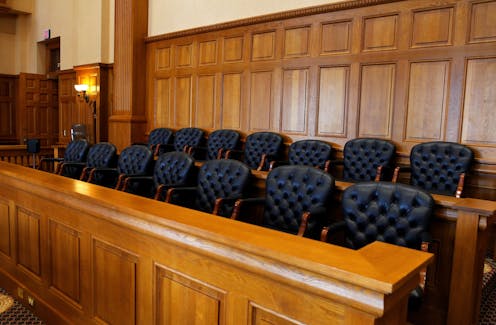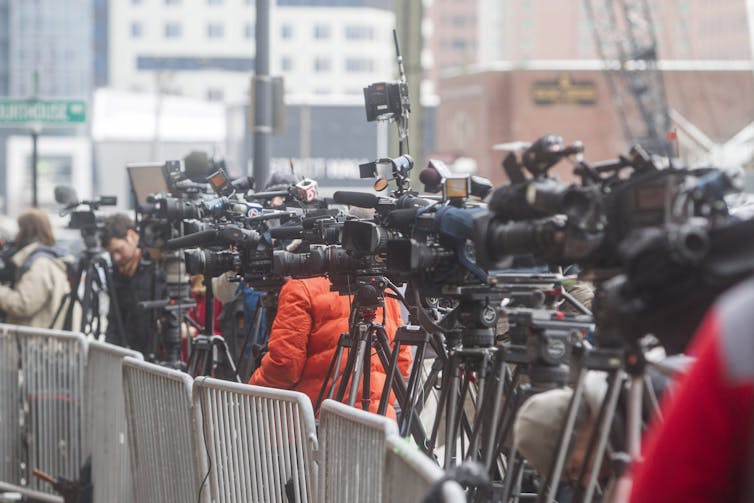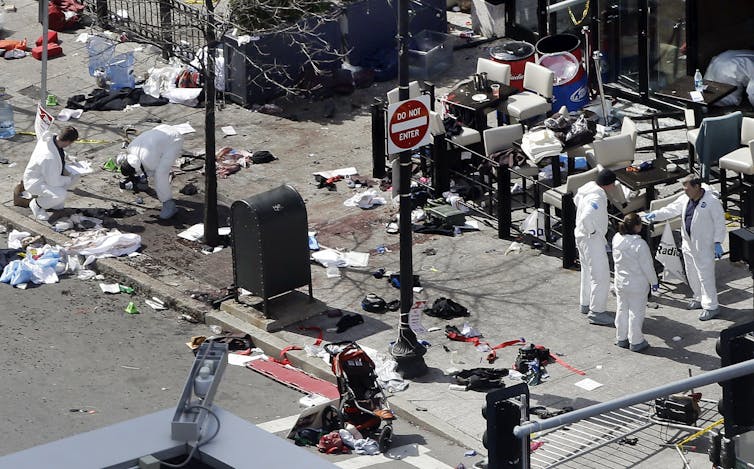
As trial dates approach for former President Donald Trump’s indictments, both he and prosecutors are already claiming it will be hard to secure an impartial jury.
Special counsel Jack Smith has said Trump’s public statements risk contaminating the jury pool for the charges he will face in a federal court in Washington, D.C., related to his efforts to overturn the results of the 2020 presidential election.
Trump has said that the jury pool is already biased because District of Columbia residents tend to vote with the Democratic Party. They certainly remember what Jan. 6, 2021, was really like on the streets of their city. And few anywhere in the U.S. have been able to avoid exposure to news coverage, online posts or in-person discussion of the 2020 election, its aftermath and the investigations that have sprung from the invasion of the Capitol and efforts to overturn the election’s results.
Trump’s lawyers, and those prosecuting him, aren’t the only ones grappling with the problem of finding unbiased jurors in the age of social media.
In October 2021, jury selection for the trial of three men accused of murdering unarmed Black jogger Ahmaud Arbery took longer than usual because many prospective jurors were exposed to media reports about Arbery’s death, including a graphic video of his killing taken by one of the defendants. The jury that was ultimately selected convicted the men, who were later sentenced to life in prison.
The Supreme Court weighs in
The question of an impartial jury reached the Supreme Court most recently in 2021, in the case of Dzhokhar Tsarnaev, the lone surviving Boston Marathon bomber. Much of the news coverage focused on whether the court would uphold the death penalty for Tsarnaev, but the case also presented a fundamental question for this era of ubiquitous social media: Is it possible to find unbiased citizens to serve on a jury in high-profile cases?
This question focuses on the voir dire process, which employs a French term that roughly translates to “speak the truth.” Voir dire occurs before the start of trial, when lawyers or the judge, depending on the jurisdiction, question prospective jurors to determine whether they harbor any kind of bias or prejudice against one of the parties.
Tsarnaev was charged with 30 counts related to the bombing of the marathon. The case had received widespread attention, including online commentary about the defendant and pictures of him carrying a bomb-laden backpack to the finish line. Voir dire in his case was extensive, lasting 21 days and involving 1,373 prospective jurors, each of whom completed a 28-page questionnaire.
At some point during voir dire, Tsarnaev’s attorney wanted the judge to ask a two-part question to prospective jurors: First, whether they had seen media coverage of the case, and second, what specifically they had seen. The judge asked the first part of the question, but not the second.

‘Does not suffice’
Tsarnaev’s lawyers appealed the death penalty, saying in part that the trial judge should have asked what media coverage jurors had seen or read about the case to ensure a fair jury.
The 1st Circuit Court of Appeals found fault with the judge, saying that asking the jurors “only whether they had read anything that might influence their opinion does not suffice,” because that sole question does not elicit “what, if anything, they have learned.” During the oral argument at the Supreme Court, Justice Sonia Sotomayor noted that “there was a whole lot of different publicity here.”
The Supreme Court ultimately ruled that “the jury selection process was both eminently reasonable and wholly consistent” with legal precedents, and upheld the death penalty sentence.
The court could have issued an opinion requiring lower courts to ask jurors more penetrating questions about their exposure to media accounts in high-profile cases.
Some lawyers believe that trial judges should be given a measure of flexibility and autonomy in how they conduct voir dire. Others wanted the Supreme Court to step in and spell out exactly how voir dire should be conducted.
Those favoring this latter approach pointed out that Tsarnaev was facing a death sentence and made four requests for a change of venue to move the case from Boston because, his lawyers argued, it would be impossible to get unbiased jurors in the local area. As a scholar of criminal law and juries, I believe a strong argument could be made that any trial judge in this situation should have taken additional steps to uncover bias in prospective jurors.
Those on the other side believe that requiring more questions will unduly lengthen the voir dire process and encroach on juror privacy. Despite these misgivings, courts around the country are increasingly questioning jurors about such topics as social media and their use of the internet.
Can’t unplug a juror
There is a larger discussion currently happening in the legal community about whether courts in the digital age can find objective jurors.
Finding unbiased jurors in the pre-digital age, even in high-profile cases, was challenging but nothing like today. Once chosen, jurors needed to maintain that unbiased status and were told not to discuss the case with anyone and to avoid radio, television and newspapers. If the case involved the death penalty, jurors might be sequestered.
Today, that same approach won’t work.
Few jurors can go eight hours, much less a whole week, without using their smartphone or social media. Many people share aspects of their life with others in real time through social media, which is incompatible with jury service. In fact, being a juror makes their social media posts more interesting to others.
In Tsarnaev’s case, juror No. 138 had a running dialogue about the case on Facebook with his friends.
Today’s jurors also have much more information available to them. By way of example, from April 4 to May 16, 2022, the Johnny Depp v. Amber Heard trial generated more social media interactions per article than inflation, the Russian invasion of Ukraine, or the leak of the Supreme Court’s abortion decision. In the past, news stories about a crime or the defendant would have been difficult to discover or access. Now they are just a click away – or may even be included in notifications pushed to jurors’ phones.

Dealing with the connected juror
Judges across the country take a variety of approaches to protect defendants from biased juries in the digital age.
Attorneys and judges will ask potential jurors questions. In addition, attorneys will investigate jurors to learn what they know about the case. This happens both in the courtroom at voir dire and online, where attorneys research jurors’ digital footprints, including social media posts. The question of how far to pry during voir dire was the main issue of concern in Tsarnaev’s case.
Once chosen, jurors are told to follow the court’s instructions, but the lure of social media can be all too tempting. Thus, courts impose penalties on jurors who are unable to follow the rules on seeking out information or discussing the case.
These penalties include holding jurors in contempt of court, taking their devices or imposing sequestration, in which jurors are put up in hotels away from their family and devices. The common theme with all penalties is that once imposed, they make citizens less inclined to want to serve as jurors.
Question time
Some legal experts believe that if jurors are given sufficient information about the case, they will be less inclined to violate court rules and go online to look for information or discuss the case. One way to improve the appropriate flow of information to jurors is to allow them to ask questions during trial.
Finally, there are calls to change jury instructions to fit the modern times. Since today’s jurors are so receptive to learning information online, they may have to be told why practices that they regularly use are prohibited while on jury duty. Those explanations could help jurors abide by the rules.
The jury, throughout its approximately 400-year history in America, has witnessed many changes in society. Through each one, the jury has adapted and survived. Thus, I believe it is highly likely the jury will weather the storm of the digital age.
This is an updated version of an article originally published Oct. 15, 2021.
Thaddeus Hoffmeister does not work for, consult, own shares in or receive funding from any company or organisation that would benefit from this article, and has disclosed no relevant affiliations beyond their academic appointment.
This article was originally published on The Conversation. Read the original article.







